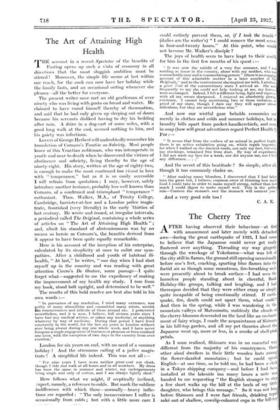The Cherry Tree
AFTER having observed their behaviour—at first with amazement and later merely with detached awe—during the great earthquake of 1925, I had come to believe that the Japanese could never get really flustered over anything. Threading my way gingerly through the wreckage of Yokohama—what was left of the city still in flames, the ground still opening occasionally before one's feet, cracking, spurting blue flames into the foetid air as though some monstrous, fire-breathing mole were presently about to break surface—I had seen the homeless people standing about in cheerful, Bank Holiday-like groups, talking and laughing, and I had thereupon decided that they were either crazy or simply quite incapable of being emotionally stirred. If earth- quake, fire, death could not upset them, what could ? And then in the spring, while I was wandering in the mountain valleys of Matsumoto, suddenly the clouds of the cherry-blossom descended on the land like an enchant- ment of fairy wings, I made the acquaintance of Shimani in his hill-top garden, and all my pet theories about the Japanese went up, more or less, in a smoke of shell-pink petals.
As I soon realized, Shimaru was in no essential way different from the majority of his countrymen, those other aloof dwellers in their little wooden huts among the flower-dazzled mountains ; but he could speak English—at one time, so he told me, he had been a clerk in a Tokyo shipping company—and before I had been installed at the lakeside inn many hours a note eras handed to me requesting " the English stranger to step a few short walks up the hill at the heels of my little daughter, who brings this message." So it was not long before Shimaru and I were fast friends, drinking tepid sak6 out- of shallow, cowslip-coloured cups in the hill-toP
0
ilerry-garden. - Two days later -Shimaru's double- wering pink cherry tree broke into full blossom, and was invited to share in the celebrations—an honour significance of which I was not, perhaps, fully aware at. the time.
It was. then that I had to revise my theories about Japanese.
The afternoon was full of swallows' wings and bird- s, ig, and silvery with flying rain, but it was warm, and, Ong cross-legged on the woven mats which were oduced silently from nowhere by Shimaru's daughter, e were able to " discuss " our sake out of doors. The ats were spread out on the green grass below the rry-tree, and there we sat, sipping thoughtfully, king out over woods and orchards to the further hills. The only thing missing," I told myself in a half-dream, k a huge, shimmering fish with a curly tail, in the t of leaping, in a swirl of golden bubbles and rainbow 'fits, from the waters of the lake yonder. Then I ould know for certain that I am not really alive at I, but belong to one of those prints of ' old Japan ' at one sees everywhere." An enormous, dusty bee filed on my cup, we sipped a little sake together— Ice, which is made of heaven knows what and tastes -e a mixture of furniture polish and mulligatawny up—and I looked out of the corner of my eye at hiantru, fully expecting to find him asleep, or, at any te, nodding happily under the genial influence of the tional liquor. He was not only more widely awake, urever, than I had yet seen him, but he was quivering uth suppreSsed excitement, like a hunting cat about spring upon fledgelings in the leaves.
Delicately he drank a little sake, and turned to me th a splutter of laughter, jabbered something in panese, recollected to whom he was speaking (his fortunate friend " MaeScoto," who, apparently, knew t the one language), and fluttered his hands upwards a gesture of mingled admiration and despair. " You him ? " he cried ; " You see him, my dancing cherry- ? All the winter I wait, I watch her budding. 1 then the bees come, and the butterflies all coloured, rple, red, gold, and the birds—they fly to her ! Yes. d now ! She is like a young girl. My cherry-blossom wer ! " After which outburst Shimaru forgot my stence—as well he might : for what did I know of an exaltation ?—and addressed himself exclusively his cherry-tree.
He talked to it all that April. afternoon, in the wind d glittering rain, till the cold woke him from his nee. He talked to it feverishly, chattered and ittered to it, wrote a poem to it, marked the flight every bird and bee among its fluttering petals, and anted a low accompaniment to their songs. And en, when the sun went down, he hung three orange terns on its lower branches, bowed very low and 'erently, and nodded affably to me as though I had t appeared, like another swallow, from the skies. Imam was on nodding terms with all the swallows that neighbourhood.) " I think," he said, " we will In now and drink one little cup of sake to bring him luck, my cherry-tree, and peaceful slumbers on IS moonlight night." The next day the whole village went singing mad tier the cherry-blossom, till at nightfall a young poet, Ink, not with sake—for that is but a mild potion ee all—but with the splendour of the cherry-misted rid, leapt into the lake to gather the reflections of hanging lanterns—and found them, where he lies even deep down among the water-lily roots.
p fe
HAMISII MACLAREN.











































 Previous page
Previous page